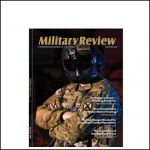
e-Document
|
Military Review, November-December 2007.
Copies
0 Total copies, 0 Copies are in,
0 Copies are out.
Armed reconciler: the military role in the amnesty, reconciliation, and reintegration process. Michael W. Mosser, Ph.D.; Experience and logic suggest general principles of the AR2 process operate in an environment of interdependent dimensions common to all cultures. In any post-conflict society, an "armed reconciler" is likely the key to making those principles succeed.
Law of occupation and post--armed-conflict governance: considerations for future conflicts. Colonel David A. Wallace, U.S. Army; According to international law, "regime change" necessarily entails interim responsibility for security and governance in Iraq. Here's what we need to know now and for future operations involving "the 'O' word."
Preemption of nuclear weapons. Tim Bakken; With Iran casting a nuclear shadow over the Middle East and Europe, a USMA law professor makes a case for a new international doctrine that addresses nuclear weapons preemption.
Armed humanitarian intervention and international law: a primer for military professionals. Colonel Daniel Rice, U.S. Army Reserve, and Major John Dehn, U.S. Army; Practical military considerations play into any decision to use force to initiate humanitarian intervention. Two experts review the moral and legal tradition for military professionals who will have to help in weighing alternatives.
Chinese military's strategic mind-set. Lieutenant Colonel Timothy L. Thomas, U.S. Army, Retired; Based on readings of recent Chinese military literature, an expert offers an illuminating peek into the rising power's strategic modus operandi.
China's Pragmatic Rise and U.S. Interests in East Asia. Major Jin H. Pak, U.S. Army; China's ongoing trade-and-aid charm offensive should be taken for what it is: not a disavowal of force, but a pragmatic ploy to help the nation attain its four strategic objectives.
Army Planning Doctrine: Identifying the Problem is the Heart of the Problem. Lieutenant Colonel Thomas G. Clark, U.S. Army, Retired, Ph.D.; The Army has long based its doctrine on the indispensable capacity to solve problems, but neither doctrine nor professional military education curricula offer a problem-structuring methodology.
Future of the uniformed army scientist and engineer program. Major John M. Thane, U.S. Army; As technology accelerates, the advantages of employing the best advances innovatively and creatively have not been lost on those developing future Army doctrine. The Army's 'warrior scientists" can help effect that doctrine.
Strategic plans and policy officer in the modular division. Major Francis J.H. Park, U.S. Army; Expert in strategic appraisal, strategic and operational planning, interservice and interagency integration, and strategic education, the functional area 59 officer plays a key role in the new modular division headquarters.
Brigade headquarters for national guard civil support teams: a homeland security imperative. Lieutenant Colonel James D. Campbell, U.S. Army National Guard; There are currently 55 civil-support teams with WMD expertise dispersed across the country. They are in dire need of a better command-and-control structure.
Contest winners
1stPlace: 2007 DePuy writing contest: S.W.E.T. and blood: essential services in the battle between insurgents and counterinsurgents. Major Erik A. Claessen, Belgian Armed Forces; Zakat-jihad organizations such as Hamas and Hezbollah are a relatively new phenomena that the West must come to grips with in the War on Terrorism.
2nd Place: 2007 DePuy writing contest: Clarity and culture in stability operations. Major Michael B. Siegl, U.S. Army; In the current and likely future operating environments, stability operations will be essential to U.S. success. It is time for the service to take this mission truly to heart.
2nd Place MacArthur writing contest: Becoming an adaptive leader. Major Harold H. Whiffen, U.S. Army; Today's Army officer must be able to recognize change and respond to it promptly and properly, as this study of a former Army star's misadventures in Iraq attests.
Book reviews: contemporary readings for the professional
Letters
Index
Title
Military Review, November-December 2007.
Call No
CDMC Military Review
Digital Link
Subjects
Language
English
Published
Fort Leavenworth, KS : Combined Arms Center,, 2007.
Series
Target Audience
Unknown or not specified









